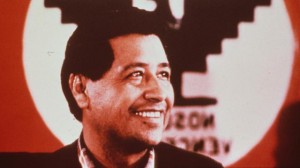March 28, 2014
Remembering the legacy of César Chávez
 Eighty seven years ago this Monday, César Chávez, a hero of the labor and civil rights movements, was born on a small ranch in Yuma, Arizona.
Eighty seven years ago this Monday, César Chávez, a hero of the labor and civil rights movements, was born on a small ranch in Yuma, Arizona.
Like thousands of others Chávez’s family lost its land in the Great Depression and headed to work in the fields of California’s central valley, where he would spend the rest of his life fighting for the rights of migrant farmworkers. Growing up, Chavez experienced grinding poverty and rampant discrimination against Mexican Americans. He left school after 8th grade and began working in the fields full time to help support his family, but he never lost his appetite for education, teaching himself about Gandhi’s non-violent strategies for social change.
Chávez’s passion for social justice led him to become a community organizer, registering Latinos to vote so they could fight for their civil rights, but he understood that farmworkers could only win dignity and respect by banding together to form a union in the fields. Even some of Chávez’s allies doubted that Spanish-speaking migrant workers could ever organize successfully, but he led the creation
of the organization that would become the United Farm Workers in 1962.
The organization struggled at first, but in 1965 Filipino workers on grape farms launched a strike demanding wages equal to the federal minimum wage (from which they were excluded) and approached Chávez for support. Chávez inspired Latino workers in the grape i
ndustry to stand in solidarity with the strike, which spread rapidly through the California fields. During the strike, Chávez pioneered unprecedented strategies that have become invaluable to all of us in the labor movement. He led workers in long marches that crossed the state of California to raise awareness of the strike, sent workers and students to cities to lead consumer boycotts
of table grapes, and even put his body on the line in a series of hunger strikes. After a grueling five year campaign, the UFW won the strike and secured living wages and a union voice in the grape fields.
After the triumph in the grape fields, the UFW grew dramatically until it represented more than 50,000 farmworkers, and farmworkers’ right to join together and bargain with their employers was e
nshrined in California law. Chávez continued to lead the UFW and fight for
the rights of workers, immigrants, and Latinos until his untimely death in 1993.
This weekend will see the release of the new movie Cesar Chavez, which document his moving story. You can find more information, including showings near you, here.